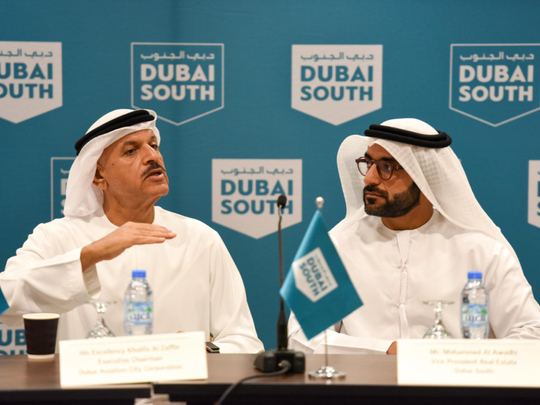
Dubai: The first handovers of freehold homes in Dubai South — the “city within a city” — is set to roll before the year end, with up to 800 units being delivered in this phase. These will all be from private developers, as Dubai creates a destination where people can live and work without having to “fight the traffic everyday”.
Unlike other masterplanned developments, Dubai South is unique in that its anchor will be the Al Maktoum International Airport, well on its way to being the world’s largest. The airport and air-side facilities take up 65 per cent of Dubai South, but “there’s still plenty left to create all of the other aspects of a city,” said Mohammad Al Awadhi, Vice-President for Real Estate with the master-developer. “It can’t be any other way when you are talking about 145 square kilometres in all for Dubai South.”
The first residential units built and sold directly by the master-developer — “The Pulse” — is scheduled for completion by mid-2019. The contract for the first seven plots, featuring 11 buildings, has been awarded to Al Qabdah, and is valued at Dh600 million. It will create about 1,200 apartments.
The off-plan sales for The Pulse was launched last year and so far 90 per cent of the units have been sold. With studios starting from Dh280,000 and with a 5 per cent down payment, it was able to set a benchmark in the city for what constitutes affordable living options. Transaction levels
In the last four quarters, Dubai South homes — coming within its Residential City cluster — have recorded some of the highest transaction levels among Dubai’s freehold clusters.
Currently, 200 plots are with private developers, and many of these are well advanced in the construction phase. It will be among these that the first units are being readied for delivery.
Top Dubai South officials declined to say how much of Residential City plots will be built directly by the master-developer. “But given the scale of the master-development, we hold as much — if not more — real estate to moderate the rest of the property market in Dubai,” said Khalifa Al Zafein, Executive Chairman of Dubai Aviation City and of Dubai South.
“We want to be where people want to work and live because it’s affordable for them — right from the blue-collar worker affiliated to the aviation and logistics industries to lower and mid-management professionals. And even senior professionals — and we have the residential options for all. It has to be as self-contained as possible.”
For staff accommodation, the location features 10 buildings and up to 1,000 rooms. Plus, it will also play host to businesses through office buildings either side of its corporate headquarters. These will be leased premises.
The master-developer has budgeted Dh1.1 billion on the infrastructure needs.
Employment opportunities
The first two phases of Residential City will also host schools and hospitals. “The land will be leased because building schools and hospitals is expensive and more so if you add the cost of land,” Al Zafein said. “We want to generate employment opportunities within the projects … and not just be another piece of real estate.
“By leasing land, we keep the costs down for the operators — “We have finalised the schools and in negotiations for the hospitals with some key operators.”
According to Al Awadhi, Dubai’s South’s strategy for Residential City will include having multiple joint ventures with select developers. “This will be over and above those plots being built by private parties,” he said. “We have JVs with Emaar, Deyaar and Lootah Group … there will be more.”












